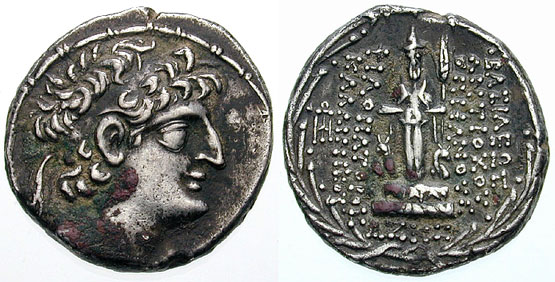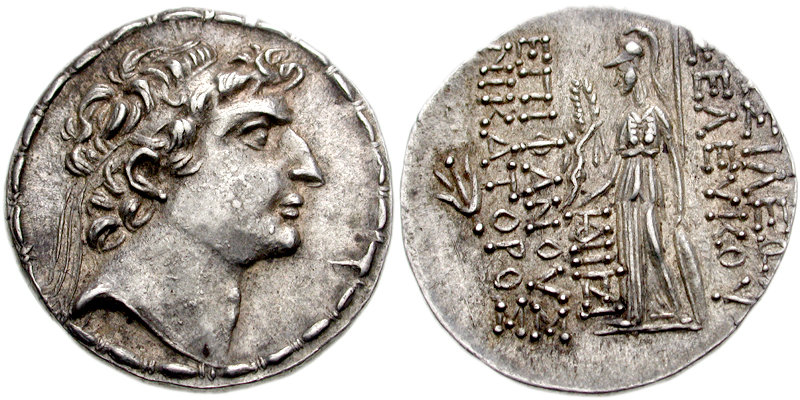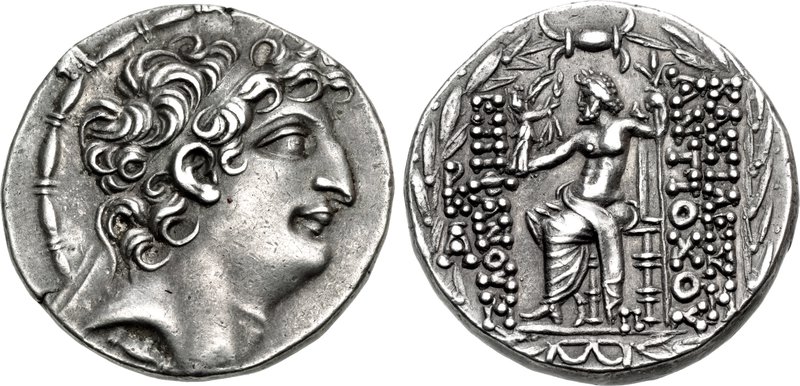|
Tryphaena
Tryphaena ( el, Τρύφαινα; c. 141 BC111 BC) was a Ptolemaic dynasty, Ptolemaic princess. She married the Seleucid king Antiochus VIII Grypus and was queen of Seleucid Empire, Syria (124–111 BC). Biography Early life and Queen of Syria It is often assumed that Tryphaena also bore the name ''Cleopatra'', but this has not been attested. She was the oldest daughter of the Egyptian king Ptolemy VIII Physcon and his niece and wife Cleopatra III of Egypt, Cleopatra III. Therefore, she was the sister of Ptolemy IX Lathyros, Ptolemy X Alexander I, Cleopatra IV of Egypt, Cleopatra IV and Cleopatra Selene of Syria, Cleopatra Selene. In 124 BC Ptolemy VIII broke with his former ally Alexander II Zabinas, instead supporting Antiochus VIII Grypus, the son of Demetrius II Nicator and Cleopatra Thea. As part of the new policy, Ptolemy VIII married his daughter Tryphaena to Antiochus VIII and also sent him reinforcements. The couple had five sons: Seleucus VI Epiphanes, the twin Antioch ... [...More Info...] [...Related Items...] OR: [Wikipedia] [Google] [Baidu] |
Demetrius III Eucaerus
Demetrius III Theos Philopator Soter Philometor Euergetes Callinicus ( grc, Δημήτριος θεός Φιλοπάτωρ σωτήρ Φιλομήτωρ Εὐεργέτης Καλλίνικος, surnamed Eucaerus; between 124 and 109 BCafter 87 BC) was a Hellenistic Seleucid monarch who reigned as the King of Syria between 96 and 87 BC. He was a son of Antiochus VIII and, most likely, his Egyptian wife Tryphaena. Demetrius III's early life was spent in a period of civil war between his father and his uncle Antiochus IX, which ended with the assassination of Antiochus VIII in 96 BC. After the death of their father, Demetrius III took control of Damascus while his brother Seleucus VI prepared for war against Antiochus IX, who occupied the Syrian capital Antioch. The civil war dragged on; Seleucus VI eliminated his uncle, whose heir Antiochus X counterattacked and drove Seleucus VI to his death. Then the twins Antiochus XI and Philip I, brothers of Demetrius III, attempted to a ... [...More Info...] [...Related Items...] OR: [Wikipedia] [Google] [Baidu] |
Antiochus XII Dionysus
Antiochus XII Dionysus Epiphanes Philopator Callinicus ( grc, Ἀντίοχος Διόνυσος Ἐπιφανής Φιλοπάτωρ Καλλίνικος; between 124 and 109 BC – 82 BC) was a Hellenistic Seleucid monarch who reigned as King of Syria between 87 and 82 BC. The youngest son of Antiochus VIII and, most likely, his Egyptian wife Tryphaena, Antiochus XII lived during a period of civil war between his father and his uncle Antiochus IX, which ended with the assassination of Antiochus VIII in 96 BC. Antiochus XII's four brothers laid claim to the throne, eliminated Antiochus IX as a claimant, and waged war against his heir Antiochus X. By 87 BC, only two claimants remained, both brothers of Antiochus XII: Demetrius III and Philip I. The realm of Demetrius III was initially centered in Damascus but later extended over most of Syria. Demetrius III was defeated by Philip I and went into exile in Parthia, allowing Antiochus XII to gain control of Damascus while Philip ... [...More Info...] [...Related Items...] OR: [Wikipedia] [Google] [Baidu] |
Queen Consort Of Syria
The title King of Syria appeared in the second century BC in referring to the Seleucid kings who ruled the entirety of the region of Syria. It was also used to refer to Aramean kings in the Greek translations of the Old Testament, mainly indicating the kings of Aram-Damascus. Following the defeat of the Ottoman Empire in World War I, the region came under the rule of France, the United Kingdom and Prince Faisal of Hejaz, who was proclaimed King of Syria on 8 March 1920. Faisal's reign lasted a few months before he was overthrown by France and the title fell out of use. Background The term Syria was first applied by Herodotus in the 5th century BC to indicate a region generally extending between Anatolia and Egypt. With the advent of the Hellenistic period, Greeks and their Seleucid dynasty used the term "Syria" to designate the region between the Mediterranean and the Euphrates. The usage of the name in referring to the region during the Iron Age (ended 586 BC) is a modern practi ... [...More Info...] [...Related Items...] OR: [Wikipedia] [Google] [Baidu] |
Antiochus VIII Grypus
Antiochus VIII Epiphanes/Callinicus/Philometor, nicknamed Grypus ( gr, Γρυπός, "hook-nose"), was the ruler of the Hellenistic Seleucid Empire from 125 to 96 BC. He was the younger son of Demetrius II and Cleopatra Thea. He may have spent his early life in Athens and returned to Syria after the deaths of his father and brother Seleucus V. At first he was joint ruler with his mother. Fearing her influence, Antiochus VIII had Cleopatra Thea poisoned in 121 BC. Political instability affected most of Antiochus VIII's reign. From 116 BC he fought a civil war against his half-brother Antiochus IX. Antiochus VIII's wife, the Ptolemaic Egyptian princess Tryphaena, had her sister and the wife of Antiochus IX, the former Cleopatra IV of Egypt, murdered in 112 BC; Antiochus IX killed Tryphaena in revenge. In 102 BC, Antiochus VIII's aunt Cleopatra III of Egypt, the mother of the two rival queens, gave him the hand of her daughter Cleopatra Selene in marriage. Antiochus VIII was ass ... [...More Info...] [...Related Items...] OR: [Wikipedia] [Google] [Baidu] |
Seleucus VI Epiphanes
Seleucus VI Epiphanes Nicator ( grc, Σέλευκος Ἐπιφανής Νικάτωρ, translit=Séleukos Epiphanís Nikátor; between 124 and 109 BC – 94 BC) was a Hellenistic Seleucid monarch who ruled Syria between 96 and 94 BC. He was the son of Antiochus VIII and his Ptolemaic Egyptian wife Tryphaena. Seleucus VI lived during a period of civil war between his father and his uncle Antiochus IX, which ended in 96 BC when Antiochus VIII was assassinated. Antiochus IX then occupied the capital Antioch while Seleucus VI established his power-base in western Cilicia and himself prepared for war. In 95 BC, Antiochus IX marched against his nephew, but lost the battle and was killed. Seleucus VI became the master of the capital but had to share Syria with his brother Demetrius III, based in Damascus, and his cousin, Antiochus IX's son Antiochus X. According to the ancient historian Appian, Seleucus VI was a violent ruler. He taxed his dominions extensively to support his wars ... [...More Info...] [...Related Items...] OR: [Wikipedia] [Google] [Baidu] |
Cleopatra IV
Cleopatra IV ( grc-gre, Κλεοπάτρα) was Queen of Egypt briefly from 116 to 115 BC, jointly with her husband Ptolemy IX Lathyros. She later became queen consort of Syria as the wife of Antiochus IX Cyzicenus.Aidan Dodson, Dyan Hilton, The Complete Royal Families of Ancient Egypt, 2004 Biography Queen of Egypt Cleopatra IV was the daughter of Ptolemy VIII Physcon and Cleopatra III of Egypt. She was born between 138 and 135 BC. She was the sister of Ptolemy IX, Ptolemy X, Cleopatra Selene I and Tryphaena. Cleopatra IV married her brother Ptolemy IX when he was still a prince in c. 119/118 BC. Cleopatra IV may be the mother of Ptolemy XII Auletes and Ptolemy of Cyprus, although an unnamed concubine could be the mother of these two men as well. Antiochus X would go on to marry Cleopatra IV's younger sister, Cleopatra Selene, thus making him the spouse of a woman who was his stepmother (Selene married both of her sisters' widowers, Grypus and Cyzicenus, before marrying Eusebes) ... [...More Info...] [...Related Items...] OR: [Wikipedia] [Google] [Baidu] |
Philip I Philadelphus
Philip I Epiphanes Philadelphus ( grc, Φίλιππος Ἐπιφανής Φιλάδελφος; between 124 and 109 BC–83 or 75 BC) was a Hellenistic Seleucid monarch who reigned as the king of Syria from 94 to either 83 or 75 BC. The son of Antiochus VIII and his wife Tryphaena, he spent his early life in a period of civil war between his father and his uncle Antiochus IX. The conflict ended with the assassination of Antiochus VIII; Antiochus IX took power in the Syrian capital Antioch, but soon fell in battle with Antiochus VIII's eldest son Seleucus VI. After the murder of Seleucus VI in 94 BC, Philip I became king with his twin brother Antiochus XI, and planned to avenge Seleucus VI. In 93 BC Antiochus XI took Antioch from Antiochus IX's son Antiochus X. Antiochus XI became the senior king, and Philip I remained in a base in Cilicia. Antiochus X returned and killed Antiochus XI that year. Philip I then allied with his younger brother Demetrius III, who was based in Dama ... [...More Info...] [...Related Items...] OR: [Wikipedia] [Google] [Baidu] |
Cleopatra IV Of Egypt
Cleopatra IV ( grc-gre, Κλεοπάτρα) was Queen of Egypt briefly from 116 to 115 BC, jointly with her husband Ptolemy IX Lathyros. She later became queen consort of Syria as the wife of Antiochus IX Cyzicenus.Aidan Dodson, Dyan Hilton, The Complete Royal Families of Ancient Egypt, 2004 Biography Queen of Egypt Cleopatra IV was the daughter of Ptolemy VIII Physcon and Cleopatra III of Egypt. She was born between 138 and 135 BC. She was the sister of Ptolemy IX, Ptolemy X, Cleopatra Selene I and Tryphaena. Cleopatra IV married her brother Ptolemy IX when he was still a prince in c. 119/118 BC. Cleopatra IV may be the mother of Ptolemy XII Auletes and Ptolemy of Cyprus, although an unnamed concubine could be the mother of these two men as well. Antiochus X would go on to marry Cleopatra IV's younger sister, Cleopatra Selene, thus making him the spouse of a woman who was his stepmother (Selene married both of her sisters' widowers, Grypus and Cyzicenus, before marrying Eusebes ... [...More Info...] [...Related Items...] OR: [Wikipedia] [Google] [Baidu] |
Antiochus XI Epiphanes
Antiochus XI Epiphanes Philadelphus ( gr, Ἀντίοχος Ἐπιφανής Φιλάδελφος; died 93 BC) was a Seleucid monarch who reigned as King of Syria between 94 and 93 BC, during the Hellenistic period. He was the son of AntiochusVIII and his wife Tryphaena. AntiochusXI's early life was a time of constant civil war between his father and his uncle AntiochusIX. The conflict ended with the assassination of AntiochusVIII, followed by the establishment of AntiochusIX in Antioch, the capital of Syria. AntiochusVIII's eldest son SeleucusVI, in control of western Cilicia, marched against his uncle and had him killed, taking Antioch for himself, only to be expelled from it and driven to his death in 94 BC by AntiochusIX's son AntiochusX. Following the murder of SeleucusVI, AntiochusXI declared himself king jointly with his twin brother PhilipI. Dubious ancient accounts, which may be contradicted by archaeological evidence, report that AntiochusXI's first act was to aven ... [...More Info...] [...Related Items...] OR: [Wikipedia] [Google] [Baidu] |
Ptolemaic Dynasty
The Ptolemaic dynasty (; grc, Πτολεμαῖοι, ''Ptolemaioi''), sometimes referred to as the Lagid dynasty (Λαγίδαι, ''Lagidae;'' after Ptolemy I's father, Lagus), was a Macedonian Greek royal dynasty which ruled the Ptolemaic Kingdom in Ancient Egypt during the Hellenistic period. Their rule lasted for 275 years, from 305 to 30 BC. The Ptolemaic was the last dynasty of ancient Egypt. Ptolemy, one of the seven somatophylakes (bodyguard companions), a general and possible half-brother of Alexander the Great, was appointed satrap of Egypt after Alexander's death in 323 BC. In 305 BC, he declared himself Pharaoh Ptolemy I, later known as ''Sōter'' "Saviour". The Egyptians soon accepted the Ptolemies as the successors to the pharaohs of independent Egypt. Ptolemy's family ruled Egypt until the Roman conquest of 30 BC. Like the earlier dynasties of ancient Egypt, the Ptolemaic dynasty practiced inbreeding including sibling marriage, but this did not start ... [...More Info...] [...Related Items...] OR: [Wikipedia] [Google] [Baidu] |
Ptolemy VIII Physcon
Ptolemy VIII Euergetes II Tryphon ( gr, Πτολεμαῖος Εὐεργέτης Τρύφων, ''Ptolemaĩos Euergétēs Tryphon'' "Ptolemy Euergetes, the Benefactor; c. 184 BC – 28 June 116 BC), nicknamed Physcon ( "Fatty"), was a king of the Ptolemaic dynasty in Egypt. He was the younger son of King Ptolemy V and Queen Cleopatra I. His reign was characterised by fierce political and military conflict with his older siblings, Ptolemy VI and Cleopatra II. Ptolemy VIII was originally made co-ruler with his siblings in the run-up to the Sixth Syrian War. In the course of that war, Ptolemy VI was captured and Ptolemy VIII became sole king of Egypt. When the war ended and Ptolemy VI was restored to the throne in 168 BC, the two brothers continued to quarrel. In 164 BC Ptolemy VIII drove out his brother and became sole king of the Ptolemaic empire, but he was expelled in turn in 163 BC. As a result of Roman Republic, Roman intervention, Ptole ... [...More Info...] [...Related Items...] OR: [Wikipedia] [Google] [Baidu] |
Cleopatra Thea
Cleopatra Thea ( el, Κλεοπάτρα Θεά, which means "Cleopatra the Goddess"; c. 164 – 121 BC) surnamed Eueteria (i.e., "good-harvest/fruitful season") was the ruler of the Hellenistic Seleucid Empire. She was queen consort of Syria from 150 to about 125 BC as the wife of three Syrian kings: Alexander Balas, Demetrius II Nicator, and Antiochus VII Sidetes. She ruled Syria from 125 BC after the death of Demetrius II Nicator, eventually in co-regency with her son Antiochus VIII Grypus until 121 or 120 BC.Aidan Dodson, Dyan Hilton, The Complete Royal Families of Ancient Egypt, 2004Cleopatra Thea by Chris Bennett Biography Childhood and first marriage Cleopatra Thea grew up in Egypt as the daughter of |





